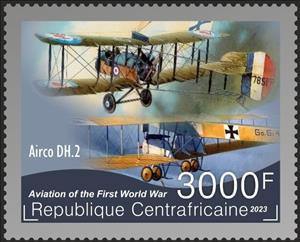Stamp: World War I Aviation (Central African Republic 2023)
World War I Aviation (Central African Republic 2023)
01 January (Central African Republic ) within release World War I Aviation (2023) goes into circulation Stamp World War I Aviation face value 3,000 Central African CFA franc
| Stamp World War I Aviation in catalogues | |
|---|---|
| Colnect codes: | Col: CF 2023-256 |
Stamp is square format.
This item is produced by the counterfeit producer located in Moscow, Russia and distributed by criminal counterfeit stamp dealers located in Eastern Europe mainly in Kazakhstan and Estonia. Avoid anyone selling this!Also in the issue World War I Aviation (2023):
- Stamp - World War I Aviation face value 3,000;
- Stamp - World War I Aviation face value 3,000;
- Stamp - World War I Aviation face value 3,000;
- Stamp - World War I Aviation face value 3,000;
- Stamp - World War I Aviation face value 3,000;
- Stamp - World War I Aviation face value 3,000;
- Stamp - World War I Aviation face value 3,000;
- Stamp - World War I Aviation face value 3,000;
- Souvenir Sheet - World War I Aviation face value 3,000;
|
Data entry completed
50%
|
|
|---|---|
| Stamp World War I Aviation in digits | |
| Country: | Central African Republic |
| Date: | 2023-01-01 |
| Emission: | Illegal |
| Format: | Stamp |
| Face Value: | 3,000 Central African CFA franc |
Stamp World War I Aviation it reflects the thematic directions:
An aircraft (pl. aircraft) is a vehicle that is able to fly by gaining support from the air. It counters the force of gravity by using either static lift or the dynamic lift of an airfoil, or, in a few cases, direct downward thrust from its engines. Common examples of aircraft include airplanes, rotorcraft (including helicopters), airships (including blimps), gliders, paramotors, and hot air balloons.Part 1 (Definitions and Abbreviations) of Subchapter A of Chapter I of Title 14 of the U. S. Code of Federal Regulations states that aircraft "means a device that is used or intended to be used for flight in the air."
Aviation is the practical aspect or art of aeronautics, being the design, development, production, operation and use of aircraft, especially heavier than air aircraft. The word aviation was coined by French writer and former naval officer Gabriel La Landelle in 1863, from the verb avier (synonymous flying), itself derived from the Latin word avis ("bird") and the suffix -ation.
World War I or the First World War (28 July 1914 – 11 November 1918), also known as the Great War, was a global conflict between two coalitions: the Allies (or Entente) and the Central Powers. Main areas of conflict included Europe and the Middle East, as well as parts of Africa and the Asia-Pacific. There were important developments in weaponry including tanks, aircraft, artillery, machine guns, and chemical weapons. One of the deadliest conflicts in history, it resulted in an estimated 30 million military casualties, plus another 8 million civilian deaths from war-related causes and genocide. The movement of large numbers of people was a major factor in the deadly Spanish flu pandemic.


